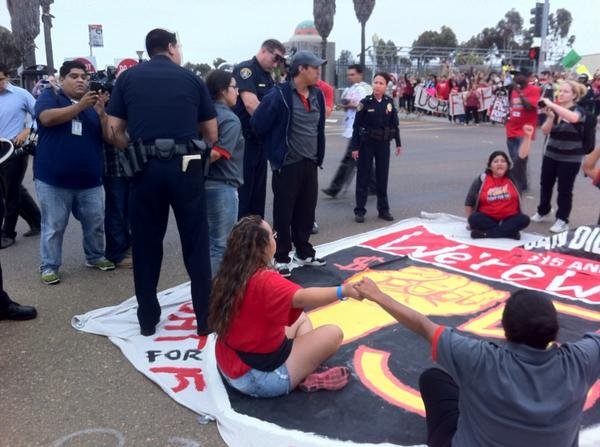
Protesters are arrested after refusing to leave a City Heights intersection, Sept. 4, 2013. | Photo Credit: Erik Anderson
Fast-food workers in San Diego took to the streets of City Heights Thursday as part of a one-day strike in up to 150 cities nationwide to press their demands for pay of $15 an hour and the right to unionize.
“Beginning earlier this morning, all the way from New York City, moving west we have been fighting for what we believe is right,” said Reverend Lee Hill, of the United Church of Christ.
The local workers and their supporters gathered near a McDonald’s in City Heights early Thursday morning, then began marching to nearby Burger King and Jack in the Box restaurants.
Organizers said similar events are scheduled to take place in anywhere from 100 to 150 cities nationwide, though it’s unclear how many workers will participate.
At one point during the local protests, strikers were sitting in the roadway on University Avenue over Interstate 15. About a dozen people were arrested and taken away by police.
Fast-food employees, with backing from the Service Employees International Union, have been making their case for higher wages for about two years.
They say the eateries aren’t run by teenagers like in the old days but by adults with children and financial responsibilities. According to Payscale.com, fast-food employees’ earn hourly wages ranging from $7.16 to $8.95, depending on location.
San Diego Assemblywoman Lorena Gonzalez, who is a Democrat, said progress is being made. She cited the state decision to raise the minimum wage, and similar efforts in all of California’s large cities. She said people see a change needs to be made.
“The disparity between what the CEO makes and the average worker has grown every single year,” Gonzalez said. “Profits are boundless right now for these big corporations, and yet, the rank and file workers, the people who are on the streets, have to rely on public services and we as taxpayers are funding that. So we’re really subsidizing these big corporations and its time that all of us get together and say, that’s just not okay.”
The efforts by the workers and SEIU have been boosted by heightened awareness of what they call “income inequality” and the passage of higher minimum wage standards in the state of California and several cities, including San Diego. The $15-an-hour figure was adopted as the minimum wage in Seattle, but with some exceptions and long phase-in periods.
The movement by fast-food workers was noted by President Barack Obama in his Labor Day speech.
McDonald’s issued a statement saying the company respects the right to peacefully protest and that the topic of minimum wage “goes well beyond McDonald’s — it affects our country’s entire workforce.”
“McDonald’s and our independent franchisees support paying our valued employees fair wages aligned with a competitive marketplace,” the company statement said. “We believe that any minimum wage increase should be implemented over time so that the impact on owners of small and medium-sized businesses — like the ones who own and operate the majority of our restaurants — is manageable.”
McDonald’s does not determine wages set by its more than 3,000 franchisees, according to the statement.
